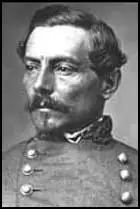Pierre Beauregard

Pierre Toutant Beauregard was born in St. Bernard Parish, Louisiana, on 28th May, 1818. He was educated at the U.S. Military Academy at West Point and graduated in 1838, standing 2nd in his class of 45. He served in the Corps of Engineers during the Mexican War (1846-48) and was wounded twice.
Beauregard was Superintendent of the US Military Academy until he resigned in 1861 to join the Confederate Army. His first posting was to Charleston, South Carolina. President Jefferson Davis took the view that after a state seceded, federal forts became the property of the state.
Beauregard was given responsibility of taking over Fort Sumter. On 12th April, 1861, Beauregard demanded that Major Robert Anderson surrender Fort Sumter. Anderson replied that he would be willing to leave the fort in two days when his supplies were exhausted. Beauregard rejected this offer and ordered his Confederate troops to open fire. After 34 hours of bombardment the fort was severely damaged and Anderson was forced to surrender.
On 21st July, Beauregard took part the the first battle at Bull Run against the Union Army led by Irvin McDowell. The Confederate troops led by Beauregard, Joseph E. Johnston, Thomas Stonewall Jackson and James Jeb Stuart easily defeated the inexperienced Union troops. Northern casualties totaled 1,492 with another 1,216 missing.
President Jefferson Davis was impressed with Beauregard's achievements and on 31st August, was was appointed general of the Confederate Army. On 6th April Beauregard attacked Grant's army at Shiloh. Taken by surprise, Grant's army suffered heavy losses until the arrival of General Don Carlos Buell and reinforcements. Beauregard took command when his superior, Albert S. Johnston was killed and retreated to Corinth, Mississippi. The Union Army suffered 13,000 casualties and the Confederates lost 10,000. However, the Union Army, with the arrival of General Henry Halleck and his troops, were now the stronger and had little difficulty driving Beauregard out of Corinth.
Beauregard was taken ill in June, 1862 and while recovering his command of the Confederate Army went to Braxton Bragg. When Beauregard regained his fitness he was placed in charge of coastal defenses in Georgia and the Carolinas. In April he was brought back to Virginia and in May 1864 he defeated a Union army under General Benjamin Butler at Drury's Bluff.
After the American Civil War Beauregard was a railroad president and of the Louisiana Lottery. Pierre Toutant Beauregard, who wrote The Campaign and Battle of Manassas (1891), died on February 20, 1893 in New Orleans, Louisiana.
Primary Sources
(1) Ulysses Grant, Personal Memoirs of U. S. Grant (1885)
General Albert Sidney Johnston, who commanded the Confederate forces at the beginning of the battle (Siloh), was disabled by a wound on the afternoon of the first day. This wound, as I understood afterwards, was not necessarily fatal, or even dangerous. But he was a man who would not abandon what he deemed an important trust in the face of danger and consequently continued in the saddle, commanding, until so exhausted by the loss of blood that he had to be taken from his horse, and soon after died.
General Beauregard was next in rank to Johnston and succeeded to the command, which he retained to the close of the battle and during the subsequent retreat on Corinth, as well as in the siege of that place. His tactics have been severely criticised by Confederate writers, but I do not believe his fallen chief could have done any better under the circumstances. Some of these critics claim that Shiloh was won when Johnson fell, and that if he had not fallen the army under me would have been annihilated or captured.
Our loss in the two days' fight was 1,754 killed, 8,408 wounded and 2,885 missing. Of these, 2,103 were in the Army of the Ohio. Beauregard reported a total loss of 10,699, of whom 1,728 were killed, 8,012 wounded and 957 missing. This estimate must be incorrect. We buried, by actual count, more of the enemy's dead alone than is here reported, and 4,000 was the estimate of the burial parties for the whole field.

